Статьи журнала - Arctic and North
Все статьи: 972
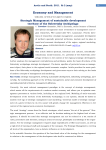
Strategic management of the Solovetsky islands sustainable development
Статья научная
This article defines spiritual, historical and cultural, scientificallyeducational, social-economic, etc. potential of the Solovetsky archipelago territory in the context of the regional strategic development. Author analyses the management contradictions and problems, points the basic directions of the Solovetsky archipelago strategic development. It’s shown specifics of protected areas as management object, their place in the regional social-economic complex. Article provides the main problems of the Solovetsky archipelago development and gives some ways to their solving on the basis of modern concepts of management and marketing.
Бесплатно
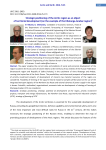
Статья научная
The paper analyzes the current state and problems of social and economic development of the region located in the Arctic zone of Eastern Siberia at the territory of two entities of the Russian Federation (Krasnoyarsk region and Republic of Sakha (Yakutia), in the catchment of rivers Khatanga and Anabar, running into Laptev Sea of the Arctic Ocean. The possibilities, restrictions and prospects of implementation of priority investment projects of development of mineral raw material resources of the region are considered. Feasibility of forming of the aqua-territorial industrial complex (ATIC) based on the use of the integrated transport logistics of the Northern Sea Route and rational schemes of power supply in the region is shown. Scientific, methodical, organizational, economic tasks on development of strategy of forming of Khatanga-Anabar ATIC are considered.
Бесплатно
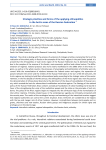
Статья научная
The article is dealing with the process of evolution of strategic priorities and practical forms of the realization of the ethnic policy in Russia on the example of the Arctic regions in the post-Soviet period. It is proved that the ethnopolitics of each Arctic region of the Russian Federation has its distinctive features, due to the complex of the reasons of its climatic, socio-economic, political and cultural nature. The differentiation of regional, national practices was more clearly manifested in the 1990s when in the Arctic regions, as well as in the whole country, the processes of sovereignty and politicization of ethnicity were observed. With the normalization of relations between the Federal center and regions, the separation of powers between the center and the entities of the Russian Federation at the turn of XX-XXI centuries, the Arctic regions are starting to build their ethnonational policy according to the strategic vision of the center. However, in the first decade of the XXI century, the ethnopolitics of the Arctic regions was more focused on the demonstration of ethnocultural diversity to the detriment of the ideas of consolidation of Russian society, which created the basis for ethnocultural mobilization and ethnic-egoism. The Strategy of the national policy of the Russian Federation 2012, contains conceptual foundations of nation-building and is biased in favor of the strengthening the unity of the multiethnic people and the state on the principles of civil solidarity. The policy of the Arctic regions begins to integrate into the all-Russian logic of the normalization of inter-ethnic relations. Ethnicity-related issues in the contemporary agenda are intimately connected with the security ones. The results of the sociological surveys and monitoring of the interethnic tensions suggest that regional authorities can control the current situation. Arctic territories are considered as the regions with the low and meager rate of ethnic tensions. However, contradictions between local people and migrants, old-timers and new settlers, Russian ethnic groups and indigenous peoples for similar rights and privileges are in the latent stage.
Бесплатно
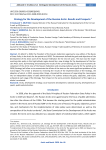
Strategy for the development of the Russian Arctic. Results and prospects
Статья научная
On March 5, 2020, the President of the Russian Federation approved a new edition of the Basics of State Policy in the Arctic for the period until 2035. The document defined the goals and objectives of the development of the Arctic zone of the Russian Federation for the next 15 years. The main tool for implementing state policy in this high-latitude region should be a new strategy for the development of the Russian Arctic zone. Summarizing and analyzing the results of the current Strategy for the socio-economic development of the Arctic zone of the Russian Federation and ensuring national security for the period up to 2020 (Strategy) will allow us to concentrate the efforts of the state on the most significant problems of the macroregion. The article is devoted to reviewing the results of the implementation of the Strategy, the adoption of which, in 2013, among other things, stimulated the processes of separating the macroregion into an independent object of state administration. The authors analyze the goals, objectives, and results achieved at each stage of the Strategy. Their impact on the socio-economic development of the region as a whole is evaluated.
Бесплатно
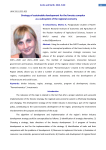
Strategy of sustainable development for the forestry complex as a subsystem of the regional economy
Статья научная
Using the method of the SWOT-analysis, the article reveals the conceptual problems of the forest industry in the region, inertial and innovative strategic scenarios, two phases of the program activities of the timber industry: 2015—2020 and 2021—2030 years. The method of management, interaction between government and business. Developed the project of the regional cluster timber industry and of model its creation. It is noted that the cluster "PomorInnovaLes" created in the Arkhangelsk Region (2014), allows you to solve a number of practical problems. Interaction of the state, regions, municipalities and businesses will attract investment, and the development of infrastructure and social issues.
Бесплатно
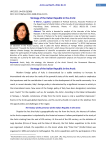
Strategy of the Italian Republic in the Arctic
Статья научная
This article is devoted to analysis of the interests of the Italian Republic in the Arctic. Despite the geographical distance Italy from the Arctic, the interest of Italians to the Arctic cooperation is due to historical reasons: Italians participated in the study of the Arctic since the end of the XIX century. That's scientific achievements in the field of Arctic studies have provided Italy's place in the "Arctic Club of non-Arctic countries". In 2013, Italy became an observer in the Arctic Council, and in 2016 the Italian Ministry of Foreign Affairs presented the document "Towards the Italian strategy for the Arctic", which shows the country's interests in the region to address climate change, the development of scientific co-operation and economic development of the region the participation of leading Italian companies. Thus, Italy marked the importance of the Arctic in the direction of its policy. Russia is one of the most important Italian partners in Arctic affairs. As economic interests are a priority for both sides, the main bilateral cooperation projects are focused on energy and transport.
Бесплатно
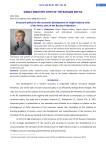
Статья научная
The author's approaches to the study of the problem of the structural policy and the specifics of the formation of the infrastructure of single-industry cities on the territory of the Russian Arctic are presented for discussion in the scientific community. The author marks urgent problems in the structure of the economy and its individual elements, reveals resource restrictions and specifics of infrastructure state of single-industry cities on the territory of the Russian Arctic. The author proves the expediency of the formation of new approaches to the construction of a model of economic development of single-industry cities based on innovations and individual regional competitive advantages. The author uses a complex analysis of the structural development of the economy of the Arctic zone.
Бесплатно
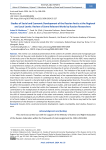
Статья научная
This review is an analytical presentation of the content of scientific articles and monographs published in the last few years and devoted to the problems of socio-economic development of the territories of the Arctic zone of the Russian Federation (AZRF). Since the legal recognition of the AZRF, many empirical studies have been devoted to the issues of its socio-economic development. However, the literature review in them is limited to the selected narrow subject of research. This circumstance creates an urgent need for a comprehensive analysis of currently relevant directions in the study of socio-economic processes in the AZRF. The purpose of this article is to demonstrate the diversity of vectors of scientific search in contemporary Russian studies of social and economic processes in the Arctic. The limitation of the study is the significant growth of publications on the topics of interest to us, caused by the variety of specific issues covered in the latest Arctic research. Therefore, we have selected only a few representative works that reflect the multi-vector nature of Arctic research in contemporary Russia. As a result of analyzing the works, we have found that Arctic research is characterized by both thematic and geographical diversity. The authors conditionally divide contemporary Arctic studies in Russia into three directions: interregional comparative studies within the boundaries of the entire AZRF, regional case studies, and local studies (at the level of municipalities). It is important to note that within the framework of the last two directions of research the key contribution to the multiplication of empirical material and its conceptual understanding is primarily made by scientists from regional scientific and university centers. Another peculiarity of Russian Arctic research is the shift of interest towards the study of the urban environment, industrial centers, and urbanism, while economists and sociologists pay insufficient attention to the study of the rural periphery. The observed deficit of local studies of social and economic processes in the rural Arctic in the future may lead to the rapid development of this direction in contemporary Russian science.
Бесплатно
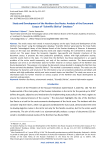
Статья научная
The article traces main trends in research progress on the topic “Study and development of the Northern Sea Route” using the bibliographic database “Scientific Sibirica” generated by the State Public Scientific Technological Library of the Siberian Branch of the Russian Academy of Sciences. A document corpus on the topic was identified using key words and subject heading, the scientometric analysis was carried out. The paper shows the temporal, linguistic, type-specific and thematic structures of the document corpus. It presents the most productive periodicals, authors with high publication activity, scientific events held on the topic. It’s noted that the Northern Sea Route development is an urgent problem of the entire world community, not only of the northern countries. The above-mentioned database can serve as an information basis for further research on various aspects of the Northern Sea Route development. The purpose is to analyze the document corpus devoted to studying the Northern Sea Route retrieved the database “Scientific Sibirica”. The method is scientometric analysis. The results are the following: the dynamics and structure of the information array are presented, productive periodicals and authors with high publication activity and main research topics are identified. The study can serve as an information basis for further research on various aspects of the Northern Sea Route development by scientists and specialists.
Бесплатно
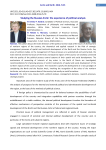
Studying the Russian Arctic: the experience of political analysis
Статья научная
The authors discuss the main directions of the political science study of the issues of development of northern regions of the country, the theoretical and applied research in the field of strategic management processes of spatial and territorial development of the North and the Russian Arctic. Key areas of political studies on the management of these processes are systematized and summarized, the main external and internal issues of the Arctic and subarctic regions of the country are analized, connected with the quality of the political process control systems of their spatial and social development. The mechanisms of accounting of interests of key actors in the North of Russia are investigated, recommendations for improving process of control mechanisms of spatial and social development of the northern regions of the country are given. The researchers specify the development of a new paradigm of considering the North and the Russian Arctic, involving the recognition of the value of the northern territories, not only as a resource base of the country, but mostly as social formations.
Бесплатно
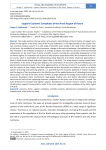
Support Economic Complexes of the Arctic Region of Russia
Статья научная
The study examines the key vectors of economic intensification of the formation of support complexes for the regions of the Arctic zone of the Russian Federation. In the high latitudes of the country, Russian scientists conduct research in a wide range of scientific areas related to the study of the climatic state of the Arctic, the availability of natural resources, changes in the natural landscape, the application of high-tech methods in the industrial production of strategic products and materials. Climatic and environmental components are the main focus of Arctic scientific research, ensuring the sustainable development of the Far North regions. An important role is given to international cooperation within the framework of the Arctic Council, which is responsible for implementing timely decisions to promote situational approaches related to rapid climate change and other urgent tasks in the Arctic. The study presents newly created industrial facilities in the areas of large open deposits, the construction of new ports and port infrastructure, implemented investment projects in the Arctic agglomerations, on the basis of which it is possible to conclude that the system of state support has been optimized and that businesses are ready to assist in the development of existing and promising projects. It is specified that the economic potential of natural resources and the degree of their use depend on the effectiveness of the applied measures of technological and regulatory nature. The role of the cities of the Far North as large industrial and energy centers with a diversified economy, developed urban environment, high-quality medical care and decent educational activities, which are the basis of the supporting economic complexes of the Arctic zone of the country, is noted. The main directions for transport and logistics support, development of mineral resource centers, energy and infrastructure support are presented in order to form the support economic complexes of the Arctic region of Russia.
Бесплатно

Статья научная
The article describes the aspects of sustainable development in the Arctic fishing industry as a socio-ecological-economic system. Describes the relationships and conflicts between the subsystems of the system, the directions of the state for fisheries management as a socio- ecological-economic system.
Бесплатно
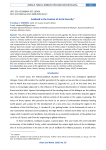
Svalbard in the context of Arctic security
Статья научная
The article studies Svalbard’s role in the Arctic security agenda, the history of the implementation of the Paris Treaty 1920 with the emphasis on its security provisions, as well as the risks of engaging Svalbard in a military conflict in the region. Despite the demilitarized status of Svalbard, the evaluation of its role in the hard security situation in the Arctic is hampered by several factors. First, Norway sticks to a narrow interpretation of the Treaty 1920 provision that bans any use of the archipelago for warlike purposes. Norway does not consider such actions as the entry of military ships in Svalbard’s ports, overfly of military aircraft, and some other, contradicting with the Russian position, a violation of the Treaty. Second, the development of technologies, particularly of “dual” use, has posed the question of whether the application of some objects situated on Svalbard by the militaries - primarily the stations of space monitoring - are legitimate. Third, as the political uncertainty in the Arctic rises, Svalbard has been more often involved in the worst-case scenarios for the region - as a place vitally important for Russia and simultaneously representing potential vulnerability for NATO. At the same time, the author argues that the threat of a military conflict over Svalbard is minimal. The international Svalbard agenda is dominated by economic issues, whereas the stakeholders stay aware of the significant risks in case of a military conflict on Svalbard.
Бесплатно
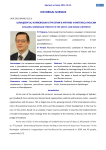
Svalbard, Norwegian strategy in the Arctic, and Russia's Interests
Статья научная
The paper describes main directives and mechanisms of Norwegian policy in the area of Svalbard in the beginning of the XXI century in conformity with Russian interests in this region. The paper is based on legal Norwegian and Russian sources.
Бесплатно
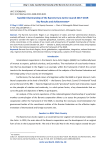
Swedish chairmanship of the Barents Euro-Arctic council 2017-2019: key results and achievements
Статья научная
The Barents Euro-Arctic Region is an integration of states and their administrative divisions, markedly different in terms of population living standards, but with a particular affinity that affords firm ground to consider the region as a separate geopolitical, economic, social and cultural macroregion. The article refers to the practical achievements of the national chairmanship of the Russian Federation in the Council of the Barents Euro-Arctic region; important aspects of the functioning of BEAR as a platform for strengthening of mutual trust and stability, respect for human rights, democratic values and gender equality, support for indigenous peoples, achievements in the fields of trade and economic cooperation, environmental protection, developments in the field of health care, tourism, industrial production, effective international transport links, urgent action to combat climate change and its impacts. The article concentrates on the analysis of key results and achievements of Swedish chairmanship of the Barents Euro-Arctic Council (October 19, 2017 - October 3, 2019), evaluating the current status and prospects for further international cooperation within the framework of the BEAR.
Бесплатно
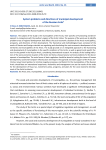
System problems and directions of municipal development of the Russian Arctic
Статья научная
The subject of the study is the municipalities of the Arctic, their specifics of functioning and development in comparison with the southern regions of the Arctic states. The purpose of the work was to identify problem areas of regional development that affects the socio-economic situation of the Arctic municipalities, prospects, and directions of their development. The theoretical and methodological basis consisted of the works of Russian and foreign scientists on regulating and stimulating the socio-economic development of the territories and municipalities of the Arctic. The study grounds on an integrated approach to the functioning and development of municipalities in the specific conditions of the Arctic, as well as general and specific factors for the growth in the Russian Arctic, considering international research. An analysis of the leading indicators of the socio-economic situation of the Arctic territories showed several common problems for the development of municipalities. The main forces of state regulation should be aimed at solving the issues of human development, social and transport infrastructure and require the approval and state support of the Arctic territories. Government policies to minimize negative processes and factors for the municipalities of the Russian Arctic should base on international experience. Authorities and management can use the results of the study for the development of fiscal, tax, investment policy, programs, and plans for the socio-economic development of the Arctic territories.
Бесплатно
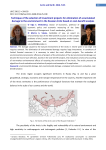
Статья научная
The damage caused to the natural environment of the Arctic in recent years is too large and requires removal. The elimination of environmental damage requires large investments. In conditions of limited financial resources it is necessary to select the most efficient projects. The evaluation of environmental and economic efficiency of projects of the elimination of the last environmental damage can become the tool of such selection, based on the cost-benefit analysis, this evaluation consists of accounting of non-market environmental effects of restoring the environment of the Arctic. The article presents an algorithm of such evaluation and selection of projects and examples of its application.
Бесплатно
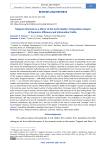
Статья научная
Analysis of the profiles of Russia's leading Arctic Telegram channels is an extremely relevant but underdeveloped research topic. The aim of the study was to identify the unique “handwriting” of the most influential Arctic Telegram channels in Russia. The objectives of the study were: to develop a methodology and criteria for identifying Russia's leading Arctic Telegram channels; to compare them in terms of quantitative and qualitative indicators (effectiveness and authority) of development over the past two years; to determine the characteristic profile of each Telegram channel. The oldest channel in terms of creation (2017), Kapitan Arktika (Capitan Arctic), has a clear authorial, systematically integrated character, the largest share of the audience viewing news on the first day of release, and the highest effectiveness and authority; the three other Telegram channels — SMP (NSR), Arktika Online (Arctic Online) and Pervy Arkticheskiy (The First Arctic) — are primarily informational in nature. SMP (created in 2019) has the largest number of active readers and subscribers, but with minimal engagement, high efficiency indicators, and is expertly assessed by us as informational and rational. Arktika Online (created in 2020) has the highest number of publications in the last two years, but the lowest number of active subscribers, the lowest share of the audience viewing news on the first day of release, and the lowest effectiveness and authority of the four leading Arctic Telegram channels in Russia. We have assessed it as informational and reactive-evaluative. The youngest Telegram channel, Pervy Arkticheskiy (created in 2022), has the highest subscriber engagement and high credibility indicators. We have assessed it as informational and descriptive. The limitations of the author’s approach are related to the lack of consideration of the qualitative structure of each channel’s audience (professional, educational, age, gender, etc.), the lack of study of the ratio of current and “strategic” news in each Telegram channel, and the assessment of the degree of reliability of the news flow of each Telegram channel. It would be advisable to develop these topics in further research.
Бесплатно
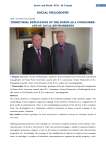
Territorial explication of the North as a conglomerate of local environments
Статья научная
The article presents a conceptual analysis of the territorial typology of the northern region. The methodology of the integrative approach typology of the northern territories as a conglomerate of local media is substantiated. There is the methodological analysis of the factors of the transition from «the development of a habitation» northern territories as bases of social typology of the northern people, Nordmen.
Бесплатно


